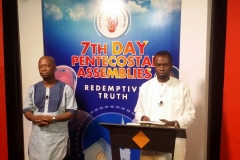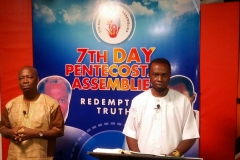A New Beginning with the Alpha And Omega
By Elder Enoch Ofori Jnr
New Year (2009) Message
It is never too early or too late for God to work miracles for us and turn our lives around. He’s the Alpha & Omega, the Beginning and the Ending (Rev. 1:8).
As we enter a new year, many of us will be casting our minds back wondering if there was anything substantial that we achieved, individually and collectively, during the past year.
There are certainly many blessings to count, but there have also been many moments of regret. Man’s life is typically full of ups and downs, and time is one of the indicators by which we measure our successes and failures.
God, by contrast, is not bound by time. He enjoys a timeless existence and, indeed, works independent of the constraints of time! For Him, a day could be as short or long as a year or a thousand years. Conversely, a thousand years could be one day (Ezek 4:6, 2 Pet 3:8). God lives forever and is not affected by the tyranny of time.
Yet how time governs our life! Our whole life – from the cradle to the grave – is really made up of segments of time. We use time to mark how old we have become and the progress we have made in life. We use time to estimate how far or near we are to reaching our set goals in life.
Marriage and raising a family is a rite of passage many consider to be a significant milestone in life. To others, it’s graduating from school and landing a good job. Our concepts of time are tied to our aspirations. When a certain time arrives and a certain achievement has not been made, we feel we are late in the race of life, or that things aren’t going well for us.
Without time, man will be less worried. And less worried we must still be as believers. We serve a God who works independent of time. We may feel time is gone past when we should have reached this or that level of achievement, but with God we should never feel we are late in life. He makes everything beautiful in its time – at a time of His own choosing not ours (Ecc 3:11).
At the wedding party at Cana, Jesus told His mother when she requested a miracle from
Him: “Woman… Mine hour is not yet come” (John 2:1-4).
One important thing Mary teaches us in this story is that we must be prepared for God’s miracle of blessing or breakthrough anytime He chooses. Thus she said to the servers at the wedding, ‘Whatsoever He saith unto you, do it” (v 5).
Next, we must be prepared to take instructions from the Miracle Worker: “Fill the waterpots with water”, Jesus told the servants in the build-up to the miracle (vs. 7).
The lesson is that we must always be in a ready position to receive divine blessings at the time He chooses to send them. When the servants obeyed Christ, the miracle of turning water into wine occurred on schedule to the joy of all. The master of the banquet queried the bridegroom: “Everyone brings out the choice wine first and then the cheaper wine after the guests have had too much to drink; but you have saved the best till now” (vv 9- 10 N1V). When God’s time arrives, He will give you the best!
Just before His death, Jesus expressed regret at the failure of Jerusalem to recognize the time of her visitation:
“If thou hadst known even thou, at least in this thy day, the things which belong unto thy peace, but now they are hid from thine eyes.
“For the days shall come upon thee, that thine enemies shall cast a trench about thee, and compass thee round, and keep thee in on every side.
“And shall lay thee even with the ground, and thy children within thee, and they shall not leave in thee one stone upon another; because thou knewest not the time of thy visitation’’ (Luke 19:42-44).
May each one of us realize the time of our visitation so that our miracle will not slip by.
In Acts 13: 41 God rebukes those who, either out of sheer malice or plain stupidity, refuses to acknowledge His hand at work in their day–a time he has chosen to work:
“Behold, ye despisers, and wonder, and perish: for I work a work in you days, a work which ye shall in no wise believe, though a man declare it unto you.”
How many failed to see the hand of God at work in the time of our late apostle and so fell away? How many still don’t see?
People who fail to acknowledge the hand of God at work in their time are doomed to destruction because they fail to avail themselves of the power of God purposely sent to deliver them!
When Jesus was rejected in Nazareth because His townsfolk didn’t see the time of their visitation, He recalled a similar incident in the days of Elijah, the prophet:
‘I tell you of a truth, many widows were in Israel in the days of Elijah, when the heaven was shut up three years and six months, when great famine was throughout all the land,
“But unto none of them was Elijah sent, save unto Sarepta, a city of Sidon, unto a woman that was a widow.
“And many lepers were in Israel in the time of Elisha the prophet; and none of them was cleansed, saving Naaman the Syrian” (Luke 4:25-27).
What was the common mistake of the people of Nazareth and the contemporaries of Elijah which led to the sick, the hungry and the oppressed perishing in their sickness and suffering?
They failed to acknowledge the hand of God in the respective ministries of Elijah and Christ.
The people Nazareth did even worse. They drove Jesus out of town and would have killed Him but for His miraculous escape (vv 28-30). Their attitude was particularly nasty: Instead of availing themselves of the power of God at work in their midst in the person of Christ, they began to say among themselves: “Is not this the carpenter’s son? Is not His mother called Mary? And His brethren, James, and Joses, and Simon, and Judas? And His sisters, are they not all with us? Whence then hath this man all these things? “(Matt l3:55-56/LK4;22).
In reply Jesus said to them: “Ye will surely say unto me this proverb, physician, heal thyself. Whatsoever we have heard done in Capernaum, do also here in thy country. Verily, I say unto you, No prophet is accepted in his own country” (Luke 4:23-24).
Subsequently Jesus entered Capernaum (His HQ – Matt 4:13-16) and ministered to the sick and the spiritually oppressed there–that same category of people left back in Nazareth because of their lack of faith and failure to take advantage of God’s time of deliverance in their midst (Matt 13:58, Luke 4:31-41).
When God’s hand of deliverance is despised and rejected in one place, it shows up elsewhere–where it’s welcome. In the end, the rejecters perish and those who welcome it rejoice.
Although Christ plainly announced to the people of Nazareth that “The Spirit of the Lord is upon Me” and that His mission there was to bring relief to all categories of suffering people, they failed to recognize their hour of visitation and remained in their suffering.
God is never late to save, but we must always be alert to the time He chooses to do the saving. In Rom. 10:21 He complains, “All day long I have stretched forth my hands unto a disobedient and gainsaying people’’ (see Isa 65:2).
God’s outstretched arm is here today. Do you realize it or will you reject it? He makes all things beautiful in His time, but we must not fail to spot that time.
The relatives of a sick man in Luke 5 did not fail to spot such a time – when “the power of the Lord was present to heal” – and let down their bedridden relative to Jesus through the ceiling of their home because of the thick crowd around Him (Luke 5:17-20).
In John 5, we read of a story where at a certain time of the year, an angel of the Lord stirs the pool of Bethsaida and the sick person who is first to get into it (after the stirring) is healed. Here, time was supremely important. The first “dive” into the pool, not the second or third, was the trick. Those sick folks who year after year did the first dives got their healing (John 5:1-4).
But one particular man failed for a successive 38 years until one day his lime came too. However, he didn’t have to step in the water; He met Jesus the great Healer!
His time had come. The Lord Jesus asked him: “Wilt thou be made whole?” Instead of an enthusiastic and straight forward answer “yes,” notice how the man responded: “Sir, I have no man, when the water is troubled to put me into the pool but while I am coming, another steppeth down before me” (v 7).
So many others had ‘stolen’ his time, or so he thought. Perhaps you think the devil or some other persons in your family, workplace, etc have stolen your time. Relax! Nobody stole your time; God’s time for your miraculous breakthrough has not yet come. And when it arrives, it won’t be like those times you consider to have been stolen/missed opportunities. You won’t struggle to try to step in the water – imagine the man fighting the supposed ‘stealers’ of his time for 38 years! You will simply take up your bed and walk! It will be a time of miracle!
So Jesus simply said to the man: “Rise, take up thy bed, and walk. And immediately the man was made whole, and took up his bed, and walked” (v 8-9).
When the divinely appointed time comes, it will not be by human might or power but by the Spirit of the Living God (Zech 4:6-7). The miracle will lift you up from your position of weakness/powerlessness to strength, and you will rest in the Sabbath blessing of God’s miracle, for “on the same day was the Sabbath” (v 9).
But let’s take another look at the man’s reaction when Jesus first asked him, “Wilt thou be made whole?” His answer should have been a straightforward ‘yes’. If he had gone too far in the narration of his ordeal at the pool of Bethsaida and doubted Jesus’ ability to heal him, he would have qualified as a “despiser” and perished in his unbelief. He could for example have gone on like this: ‘I have lain here 38 years and you ask me if I wish to be well. If it were not to get well why would I be here in the first place?’ Or he could have sneered, ‘I have been here 38 years trying to get into the water, what else can you possibly do help me?’
Such was the initial attitude of Naaman, the Syrian military commander when he came to Elisha to be cured of his leprosy. When asked to wash in the Jordan river seven times, he despised the word of the prophet, saying, ‘Are not Abana and Pharpar, rivers of Damascus, better than all the waters of Israel? May I not wash in them, and be clean? So he turned and went away in rage” (2 Kings 5:9-12). Eventually, Naaman’s servants prevailed upon him to heed the prophet’s word, and he came out of the Jordan every whit whole and clean (vv 13-14).
When the time comes for God to visit you, expect the unpredictable; that is how typically miracles happen! Most probably, the explanation given by the sick man at the Bethesda pool was meant to solicit Jesus’ help in getting him healed the way he had been accustomed to: dip him in the pool! He explained: “Sir, I have no man, when the water is troubled, to put me into the pool.’
What does Ps 72:12 say? “The Lord delivers the needy when he crieth; the poor also, and him that hath no helper.” And when He delivers, it’s by miracle, not the way we are accustomed to!
Nevertheless, our God is a God of diversity, and He can still use the familiar to work wonders. After Peter (Simon) had failed to make any catch after fishing in the lake of Gennesaret (sea of Galilee) all night, the Lord Jesus insisted he drop his nets into the same waters, and he will make a good catch. Peter went through the same routine-which had been fruitless all night-but this time there was a miracle behind! They made such a bumper catch their nets began to break. “And they beckoned to their partners, which were in the other ship, that they should come and help them. And they came, and filled both the ships, so that they began to sink” (Luke 5:4-7).
The key is, remain open to whatever time or method God chooses to work his miracles
for you. Because God is never behind in time, He can always bring restoration anytime
He wants. He promises in Joel 2:25:“And I will restore to you the years that the locust hath eaten, the cankerworm, and thecaterpillar, and the palmerworm, my great army which I sent among you.”
There is a time for everything under the sun as Eccl 3 says. Time is not static but dynamic. But as God’s children we should not just let things happen to us as though our
God has no control over events. We must commit our way to Him and He shall bring it to pass (Ps 37:5).
The two approaches to life – the ordinary way where anything at all can happen to people and the divinely led life where God is in control- find expression in the following scriptures:
“I returned, and saw under the sun, that the race is not to the swift, nor battle to the strong, neither yet bread to the wise, nor yet riches to men of understanding, nor yet favour to men of skill; but time and chance happeneth to them all‘ (Eccl 9:11).
“So then it’s not of him that willeth, nor of him that runneth, but of God that showeth mercy” (Rom 9:16).
Although implicit in Eccl. 9 is the need to take advantage of opportunities and times that come our way, as God’s children we don’t have to rely on mere time and chance – lucky breaks – to make it; we must let God control the events of our life. EccI 9:11 & Rom 9:16 show the contrast between the two approaches. Time and chance governs the lives of unbelievers for good or bad; for believers God takes definite steps to make our lives a blessing! (See Jer. 29:11).
God’s children are never late in life. He chooses to bless us at a time of His own choosing so that all things would work together for good to those of us called according to His purpose (Rom 8:28). When God is allowed to take control, the cry of the disappointed, who didn’t realize the time of their visitation, will not pass our lips:
“The harvest is past, the summer is ended, and we are not saved” (Jer 8:20).
Believers have been born to a living hope (1 Pet. 1:3). He does everything beautiful in His time. Trust Him this year and trust Him every moment. In all things acknowledge Him, lean not on your own understanding and He shall bring it to pass (Prov 3:5-6).
This year could be your year and my year of breakthrough, a year of bumper blessings, if only we recognize the power of God on our lives and avail ourselves of it. Faithfulness counts; He’s with us while we are with Him (2 Chron. 15:2). He promises never to forsake us, not in 2009 or forever for that matter.
While its day (our time), we must work (in His vineyard) as He did (John 9:4, 4:34). We have begun with the Alpha and we shall end with the Omega. He will fulfill all His purposes for our lives from the beginning to the end (Isa 45:19, 46:10). He who has begun a good work in us shall complete it (Phil 1:6). Let’s give Him no rest this year until He accomplishes it (Isa 62:7) Amen!



